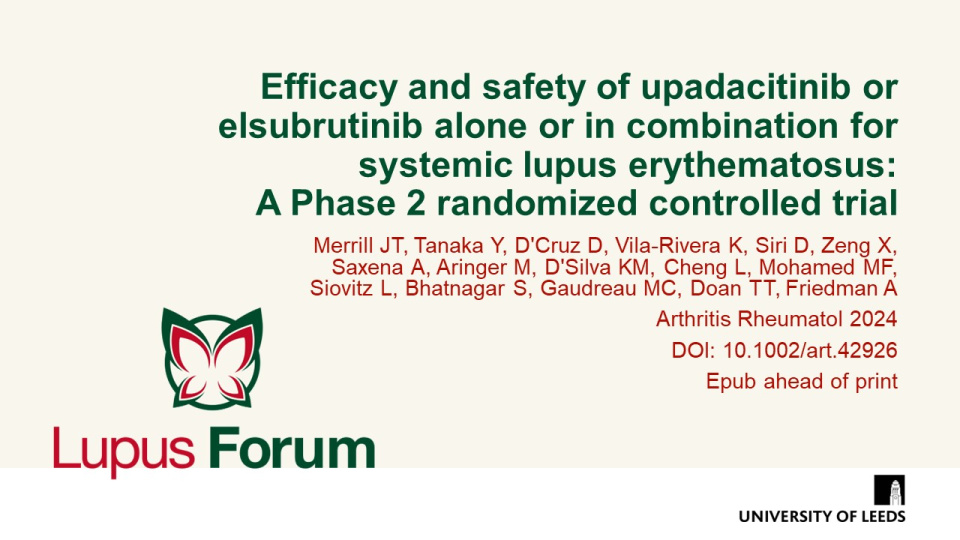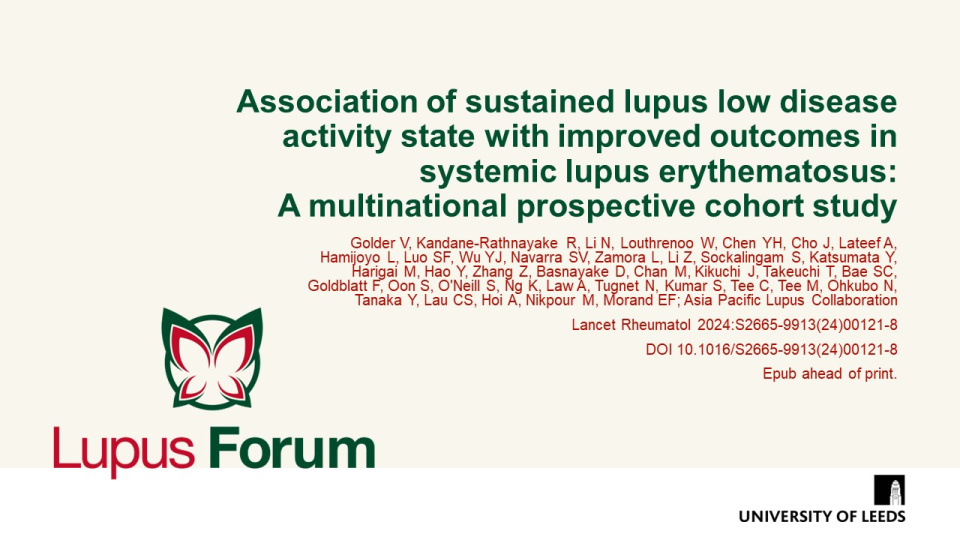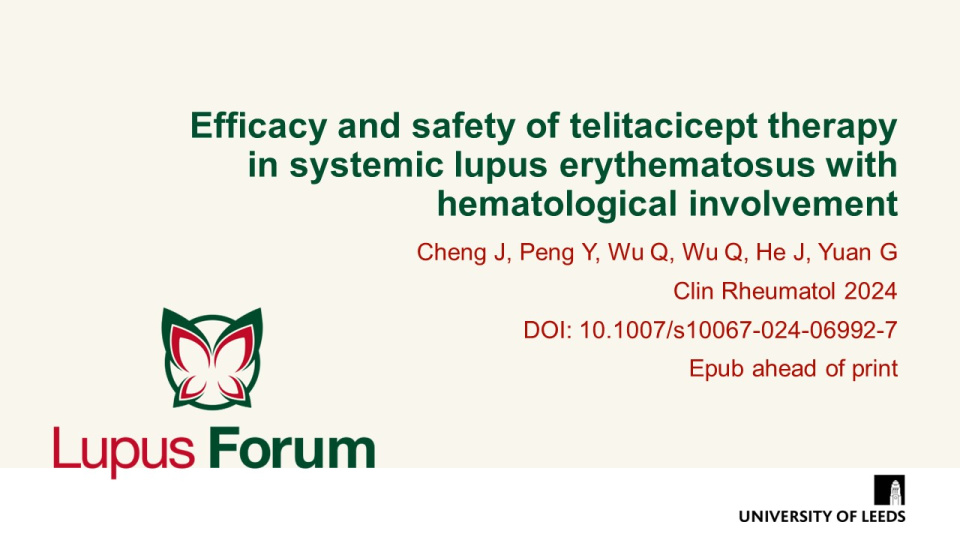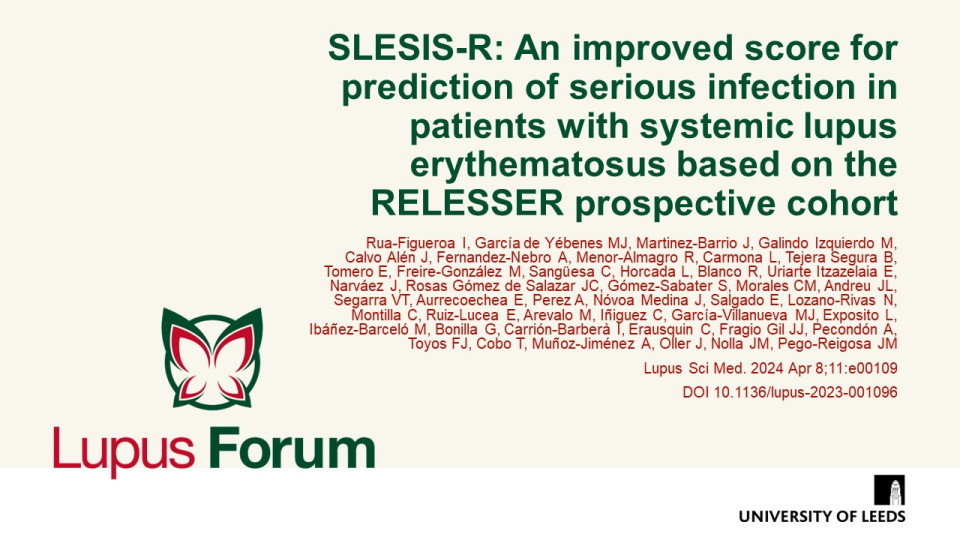Publications
Find coverage of the latest original articles on Lupus, focusing on those with data on therapeutic interventions and those that have clinical impact.
Effect of iberdomide on cutaneous manifestations in systemic lupus erythematosus: a randomized phase 2 clinical trial
JAAD. 2024. Epub ahead of print DOI: 10.1016/j.jaad.2024.09.074
Werth et al. demonstrated that iberdomide significantly improved cutaneous lupus erythematosus (CLE) outcomes, particularly in subacute and chronic CLE patients, by reducing Cutaneous Lupus Area and Severity Index Activity (CLASI-A) scores. The study showed continued efficacy through 24 weeks, with the 0.45 mg dose providing the greatest improvement in patients with severe baseline scores, and iberdomide was well-tolerated over 104 weeks.
Keywords:
Safety, pharmacokinetics, biomarker response and efficacy of E6742: a dual antagonist of Toll-like receptors 7 and 8, in a first-in-patient, randomised, double-blind, phase I/II study in systemic lupus erythematosus
RMD Open 2024;10:e004701 DOI 10.1136/rmdopen-2024-004701
Tanaka et al. conducted a phase I/II study to evaluate the safety, pharmacokinetics, biomarker response, and efficacy of E6742, a dual antagonist of Toll-like receptors 7 and 8, in patients with systemic lupus erythematosus (SLE). The treatment demonstrated a favourable safety profile, with no serious adverse events, while effectively suppressing interferon gene signatures and showing promising preliminary efficacy.
Efficacy and safety of upadacitinib or elsubrutinib alone or in combination for systemic lupus erythematosus: A Phase 2 randomized controlled trial
Arthritis Rheumatol 2024 DOI: 10.1002/art.42926 Epub ahead of print
Daily oral upadacitinib 30 mg and ABBV-599 high dose (elsubrutinib 60 mg QD + upadacitinib 30 mg) were effective in multiple outcome measures including disease activity, flares, time to first flare, and joint counts.
Keywords:
Association of sustained lupus low disease activity state with improved outcomes in systemic lupus erythematosus: a multinational prospective cohort study
Lancet Rheumatol 2024:S2665-9913(24)00121-8 DOI 10.1016/S2665-9913(24)00121-8 Epub ahead of print
This study by Golder, et al. showed a significant protective association of lupus low disease activity state (LLDAS) and remission against damage accrual and flare. The authors also found a threshold of 3 months sustained LLDAS or remission, and that 3 months of sustained LLDAS are attainable in the setting of a 6–12-month clinical trial.
Keywords:
Efficacy and safety of sequential therapy with subcutaneous belimumab and one cycle of rituximab in patients with systemic lupus erythematosus: the phase 3, randomised, placebo-controlled BLISS-BELIEVE study
Ann Rheum Dis 2024;0:1–11 DOI 10.1136/ard-2024-225686.
Aranow et al. evaluated the efficacy and safety of combining subcutaneous belimumab with one cycle of rituximab in SLE. Sequential therapy did not show a statistically significant improvement in disease control over belimumab monotherapy, but did achieve nominally better reductions in disease activity markers.
Keywords:
Efficacy and safety of telitacicept therapy in systemic lupus erythematosus with hematological involvement
Clin Rheumatol. 2024 May 20 doi: 10.1007/s10067-024-06992-7. Epub ahead of print
This real-world combination of telitacicept and standard treatment demonstrated significant improvements in anaemia, as well as increased leukocyte and platelet levels in patients with SLE and haematological involvement. Here, investigators sought to evaluate the efficacy and safety of telitacicept in combination with standard treatment in SLE patients specifically with haematological involvement.
Keywords:
Belimumab Corticosteroid‑Sparing Treatment in Systemic Lupus Erythematosus: a Real‑Life Observational Study (BESST)
Rheumatol. Int. 2024 Apr 30:1–7 DOI: 10.1007/s00296-024-05589-2 https://pubmed.ncbi.nlm.nih.gov/38687385/
Belimumab confers an early and sustained corticosteroid-sparing effect after 3 months of treatment in SLE patients. This was demonstrated by a significant prednisone dose reduction that continued through months 6 and 12, and was sustained until month 24.
SLESIS-R: an improved score for prediction of serious infection in patients with systemic lupus erythematosus based on the RELESSER prospective cohort
Lupus Sci Med. 2024; 11(1): e001096 DOI: 10.1136/lupus-2023-001096
SLESIS-R may help clinicians make informed decisions on the occurrence of a serious infection in the following year in SLE from four variables: age ≥60 years, previous admission for SLE, previous infection and having received a maximum dose of glucocorticoids ≥30 mg.
Type I interferon blockade with anifrolumab in patients with systemic lupus erythematosus modulates key immunopathological pathways in a gene expression and proteomic analysis of two Phase 3 trials
Ann Rheum Dis 2024 DOI 10.1136/ard-2023-225445 Epub ahead of print https://pubmed.ncbi.nlm.nih.gov/38569851/
Type I IFN blockade with anifrolumab modulated multiple inflammatory pathways downstream of type I IFN signalling.
Cardiovascular risk factors and complications in patients with systemic lupus erythematosus with and without nephritis: A systematic review and meta-analysis
Lupus Sci Med 2024;11(1):e001152 DOI 10.1136/lupus-2024-001152
Patients with SLE and LN show increased risk of CV risk factors including diabetes mellitus, hypertension and hyperlipidaemia versus patients without nephritis.











